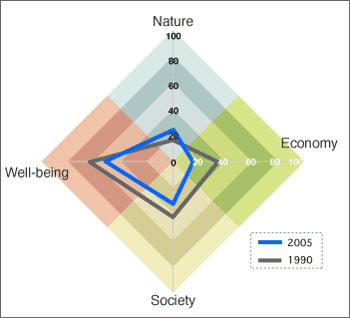ProjectsPast and current JFS projects
Evaluation-Japan’s Sustainability Down 19% (since 1990)
Japan’s Sustainability Down 19% (since 1990)
JFS has chosen 20 headline indicators for sustainability and made the first numerical evaluation of national sustainability for Japan. Results show a score of 33.5 for 2005 in relation to a hypothetical perfect score of 100 projected for 2050, down about 19% from 41.3 points for 1990. The overall analysis of the estimation shows that sustainability in Japan has rather declined than improved, though some of indicators have shown improvement.

1.Nature
There are many challenges concerning nature, as efforts by various sectors in recent years concerning climate change, resource cycling and wastes have not led to better numerical values. However, the overall point has improved slightly since 1990, reflecting increase in green consumerism, society-wide increase in environmental awareness and overall improvement in condition of water, soil and air. Though the sustainability has not improved in terms of environmental impact, we made positive evaluation considering the steadfast improvement in environmental literacy, and hoping for further improvement. Among headline indicators, climate change is the most urgent issue at present.
2. Economy
The overall score deteriorated since 1990, reflecting massive debt accumulation, which is a major issue bearing on fairness to coming generations. In light of a sustainable and self-supporting economy, extremely low self-sufficiency in food and energy remains major problem indigenous to Japan and further improvement in resource-productivity is needed. Though Japan’s economy is big in scale, the overall score is the lowest of all four categories in terms of sustainability. Future issues for our rapidly graying society include how to build new value systems and how to achieve a paradigm shift from a growth-geared economy to a sustainable one.
3. Society
Participation in society by women improved since 1990, though remaining low relative to international standard, which is favorable trend in view of diversification. The advent of investment style such as SRI, socially responsible investment, is another encouraging sign of social change, though the scale is still small compared to those of Western countries. However, as for culture and tradition, traditional industries that have figured prominently in creating Japanese cultural values are close to annihilation, so overall score deteriorated since 1990.
4. Well-being
The score for individual well-being is relatively high, as a certain level of quality of life is attained in Japan. However, suicide rates at historic high are extremely high compared to other OECD countries. Growing wealth gap represented by individual livelihood security is another sign of deteriorating sustainability, so overall score for individual well-being also deteriorates since 1990. Developing a model society, where individuals can participate and enjoy life without significant disparity irrespective of age or sex, is an issue in the future.
Previous article Indicators - Wellbeing / Wealth Gap


